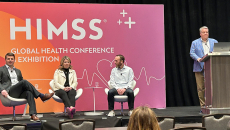Mike Miliard
Developed at the IU Indianapolis School of Dentistry and Regenstrief Institute, an NIH grant could help expand the application, which links dentists with regional health information exchanges, enabling them to view their patients' medical histories.
While "purchase energy slightly cooled" this past year, hundreds of hospitals are still searching for new electronic health records, a new KLAS report shows, and vendors that prioritize partnership and customer satisfaction are finding favor.
"While the scope and impact remains unconfirmed, the nature of the reported activity presents potential risk to organizations and individuals," according to the cybersecurity agency.
The round-the-clock service, powered by technology from Fabric and integrated with Castlight's benefits navigation app, offers chat-based visits delivered by licensed physicians and nurse practitioners.
Business school professor Joe Peppard penned a Wall Street Journal op-ed recently, making the case that many companies shouldn't necessarily be investing in AI – because many aren't well-positioned to succeed with it. What about healthcare providers?
CIOs and other healthcare technology decision-makers polled by Stoltenberg Consulting say reimbursement and workforce challenges are also top of mind as they continue to invest in artificial intelligence, cybersecurity and more.
One breach is said to have impacted legacy Oracle Health servers; another has allegedly affected millions of records accessed via Oracle Cloud.
Susan Monarez, current acting director at the U.S. Centers for Disease Control and Prevention, has previous experience in the Office of Science and Technology Policy, and worked at ARPA-H on AI applications for pop health and quality improvement.
With an eye toward the next decade of data exchange, pop health and informatics experts offered some policy ideas to help White House accomplish "big, bold things" for healthcare interoperability.
The third in a three-part series, UNC System Director For Analytical Solutions Greg Kuhnen teams up with UNC Manager of Data Science Engineering Ram Rimal to discuss ensuring responsible adoption of AI.










